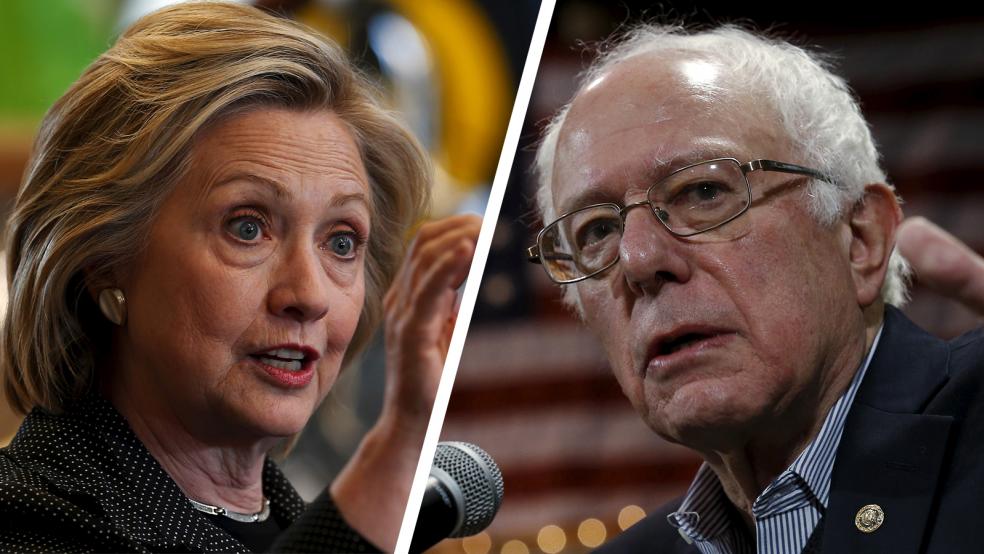On Friday, the U.S. Department of State released a slate of Hillary Clinton’s emails that was so plainly a gift to Vermont Sen. Bernie Sanders, her chief rival for the Democratic presidential nomination, that it probably ought to have been reported to the Federal Elections Commission. But Sanders, in the final days before the Iowa caucuses, has refused to open it.
Clinton surrogate have been ripping into Sanders for what one spokesperson laughably called the “most negative” Democratic primary campaign in history, mainly on the basis of a single 30-second ad that criticized unnamed politicians for taking money from Wall Street. That’s patty-cake, and the Clinton camp knows it.
Related: How Sanders Could Pull Off an Upset Over Clinton in Iowa
Recent reports have found that the Sanders camp is actively trying to tamp down the negative attacks waged on its behalf by some online supporters, and that it has even apologized to the Clinton campaign for them. This isn’t the mark of a scorched earth strategy.
Besides, if Sanders wanted to go negative, he’s got a tactical nuclear weapon in Clinton’s email scandal sitting there waiting to be used. But he hasn’t picked it up, and probably won’t.
A little background:
In the long-running saga surrounding Clinton’s use of a private email server for her correspondence as Secretary of State, the State Department has disagreed with the Intelligence community over the sensitivity of information stored on the server. But on Friday, for the first time, the State Department agreed that some of the information in emails to and from Clinton, despite not being marked as such at the time, was classified. Classified, in fact, at the level of Top Secret, which means the emails are considered too sensitive to be released even in redacted form.
Related: Another Batch of Clinton State Department Emails Contained ‘Top Secret’ Material
The attack ads write themselves, really: Even the State Department, which Clinton used to run, admits she mishandled Top Secret information.
Clinton has a convoluted defense that relies on people understanding that information can be classified retroactively, and that something Clinton sent or received years ago might have been innocuous then, but due to later events, became sensitive.
But even if that message is clearly delivered, she still has to answer for the decision to use a personal email server for State Department business. The idea that information could be retroactively classified arose only after Clinton left State. It’s one of the reasons why there are rules in place about how government employees at that level transmit and store information.
It’s arguable that the decision not to use the State Department’s own secure servers, made as either a matter of convenience or a matter of control, is disqualifying when it comes to the presidency. There is an element of recklessness in the decision that should make everyone at least stop and reflect.
Related: Iowa Caucuses – What Are They and How Do They Work?
Sanders could be hammering these points home at every stop on the campaign trail and in every television appearance or debate. But he’s not, and here’s why: Sanders knows that he is extraordinarily unlikely to win the Democratic presidential nomination, and he also knows what happens to nominees – most recently the Republican nominees in the last two presidential primaries – who spend most of a year being savaged by their own side prior to the general election.
Bernie Sanders has always been an issues candidate. He got into the race as a longshot, largely because it gave him a platform to voice his concerns about income inequality, the influence of big money in politics, and the social safety net.
Sanders is currently doing much better than he was expected to, which is great news for him in the sense that it lets him express his concerns about the state of the country to a much larger audience. But he’s still not very likely to beat Clinton. Betting markets, for instance, give Clinton a 70+ percent chance of winning the nomination.
Could Sanders close that gap by going full out against Clinton in the primary? Probably. Could he close all of it? Almost certainly not. But in making the attempt, he could easily do significant damage to Clinton’s already low public approval rating.
Related: Sanders’ Plan Would Raise Taxes a Staggering $13.6 Trillion Over a Decade
When the Republican nominee in a general election attacks her on the email question, alleging “politicization” can deflect some of the damage. But when the Republican in question is quoting a Democrat, the claims of politicization don’t work so well.
Sanders may not like the way the social safety net is structured. But forced to pick between a Clinton White House that doesn’t do enough, in his view, to strengthen it, and a Republican White House that might go along with the GOP-led Congress’s recent vote to shred it, Sanders has only one choice.
The same goes for Sanders’ other issues. He can have a Clinton White House that is more deferential to the business community than he would be, or a Republican White House that might launch a massive program of deregulation. He can have a Clinton White House that tinkers around the edges on income inequality, or a GOP White House that declares it a non-issue.
The motive of the Sanders campaign is to make Clinton sweat, and to move her a little to the left as he does it. It isn’t to torpedo her overwhelmingly likely nomination.
Sure, Bernie doesn’t want to lose. But what he wants even less is to see a Donald Trump or Ted Cruz trample a weakened Clinton in the general election, carrying banners with quotes from Sanders’ own attack ads as they go.





